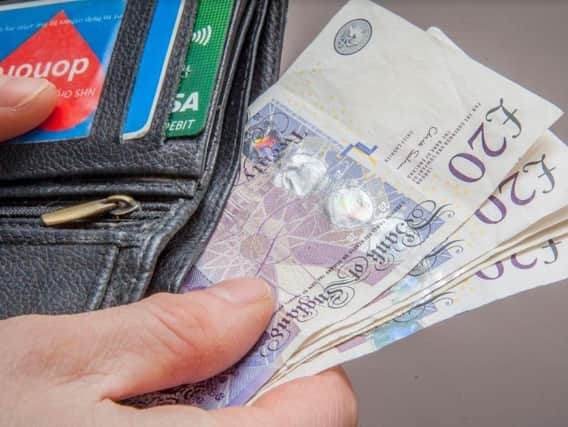Mortgage payments set to rise as Bank of England raises interest rates


That was in the days shortly before the financial crisis which, when it hit, saw interest rates cut and cut in efforts to get the economy growing again.
The last cut was in August 2016 when the rate was dropped by 0.25% to shore up the economy after the vote to leave the EU.
Advertisement
Hide AdAdvertisement
Hide AdToday the Bank of England has risen the rate by 0.25% to 0.5%.
Who will benefit?
The winners include the 45 million saves in the UK. If you have savings, you will probably see a higher return on the money you have in your savings accounts.
A number of banks and building societies have already announced they will be increasing their rates in line with the rise announced by the Bank of England today.
Who will be hit?
Savers are not the only ones who will see their interest rates rise - so will borrowers. So unless you're on a fixed-rate mortgage, you can expect your payments to go up.
Advertisement
Hide AdAdvertisement
Hide AdIf you have a £50,000 balance on your mortgage, the average currently monthly repayment will be £225 - which will go up by £6 with the rise.
For a £100,000 balance with a £450 currently monthly repayment, it will rise by £13.
For a £150,000 balance with a £675 payment, the increase will be £19.
Where will rates go from here?
A quarter-point rise will only take rates back to where they were before the last cut in August 2016, meaning that any impact is expected to be modest.
Advertisement
Hide AdAdvertisement
Hide AdWhat is more of a worry for borrowers is the outlook for further rises, with economists predicting as many as three rate increases over the next two years.
This could hit some home-owners hard, given the popularity of variable rate mortgages in the UK, meaning the impact of a rate hike can be felt very quickly by households, which are already highly indebted.
Economists believe rates could hit 1% by the end of 2019 to bring inflation to target, although the timing and degree of further hikes are highly dependent on the economy and Brexit impact.
Some predict rates could rise again as soon as February, but others expect there will be a pause until at least later in 2018.
Why does the Bank of England very interest rates?
Advertisement
Hide AdAdvertisement
Hide AdWhen the Bank of England’s Monetary Policy Committee (MPC) changes its official interest rate, it is aiming to influence the way people spend, save and borrow in order to keep the demand and supply of goods and services in balance, and keep inflation to its two per cent target.
When there is more demand for goods and services than there is supply, inflation tends to rise above 2%..
But when supply exceeds demand, inflation tends to fall below that 2% target.
A reduction in interest rates makes saving less attractive and borrowing more attractive, which stimulates spending.
Advertisement
Hide AdAdvertisement
Hide AdLower interest rates can also affect consumers’ and firms’ cash-flow – a fall in interest rates reduces the income from savings and the interest payments due on loans.
Borrowers tend to spend more of any extra money they have than lenders, so the net effect of lower interest rates through this cash-flow channel is to encourage higher spending in aggregate. The opposite occurs when interest rates are increased.
By changing Bank Rate – the rate of interest that the Bank of England pays on reserve balances held by commercial banks and building societies – the Bank of England is able to influence a range of other borrowing and lending rates set by commercial banks and building societies, and hence spending in the economy, in order to keep inflation on track to meet the 2% inflation target.
:: Why is the Bank set to raise rates now?
The Bank is looking to cool surging inflation, which has been sent higher by sharp falls in the pound since the Brexit vote.
Advertisement
Hide AdAdvertisement
Hide AdConsumer Prices Index (CPI) inflation hit 3% in September - its highest level for more than five years - and the Bank has warned it could rise further still.
The Bank is tasked by the Government with keeping CPI at 2%, but has been tolerating higher inflation amid uncertainty caused by the Brexit vote to prevent shocks to the economy.
Policymakers are now becoming less tolerant of surging inflation, given that the economy has performed better than feared since the EU referendum.
:: Is the economy strong enough to withstand a rate rise?
Growth edged up to a better-than-expected 0.4% in the third quarter from 0.3% in the previous three months, according to last week's first official estimate.
Advertisement
Hide AdAdvertisement
Hide AdThis suggests the economy is stable and no longer in need of the emergency boost delivered by the Bank after last year's Brexit vote.
But some economists have voiced fears over the timing of a rate hike, amid uncertainty caused by Brexit negotiations and a shaky consumer outlook as household finances are squeezed by rising inflation and paltry wage growth.